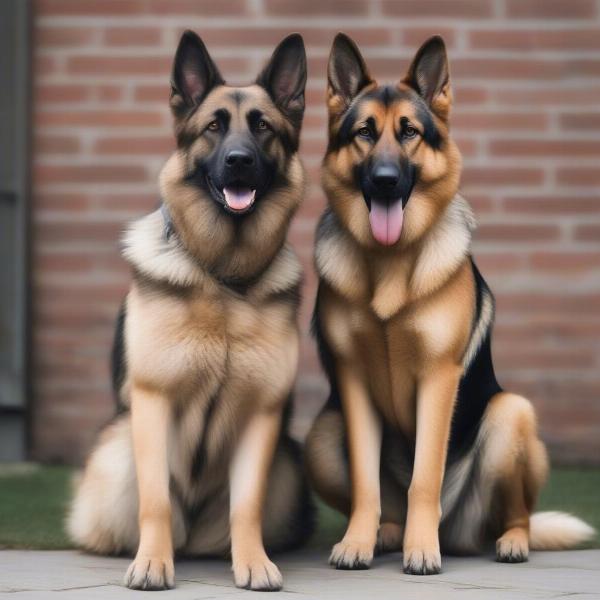The terms “Alsatian dog” and “German Shepherd” are often used interchangeably, leaving many wondering if they refer to the same breed. This article will delve into the history and characteristics of these dogs to uncover the truth behind the names. We’ll explore their origins, physical attributes, temperament, and care requirements to help you understand the subtle nuances, if any, between an Alsatian and a German Shepherd.
Unpacking the Terminology: Alsatian vs. German Shepherd
Historically, the breed originated in Germany in the late 19th century, bred by Captain Max von Stephanitz for herding and guarding. Following World War I, anti-German sentiment led to a renaming of the breed in some countries, including England and Australia. “Alsatian Wolf Dog,” later shortened to “Alsatian,” became the preferred name, referencing the Alsace-Lorraine region. This name change was primarily a political move and did not reflect any biological difference in the breed.
 Alsatian and German Shepherd Comparison
Alsatian and German Shepherd Comparison
Physical Characteristics: Are They Identical?
Both Alsatians and German Shepherds share the same breed standard, featuring a strong, muscular body, erect ears, and a double coat that comes in various colors, including black and tan, sable, and all black. They are medium to large-sized dogs, with males typically larger than females. Slight variations in appearance can occur within the breed, but these are individual differences rather than distinctions between “Alsatians” and “German Shepherds.”
Temperament and Trainability: Nature vs. Nurture
Known for their intelligence, loyalty, and courage, both names refer to dogs with similar temperamental traits. They are highly trainable and excel in various canine activities, including obedience, agility, and protection work. Early socialization and consistent training are crucial for developing a well-behaved and confident dog, regardless of whether you call them an Alsatian or a German Shepherd.
Care and Health Considerations: What to Expect
The care requirements for these dogs are identical. They need regular exercise, mental stimulation, and a balanced diet. Potential health issues, such as hip and elbow dysplasia, are also the same across the breed. Responsible breeding practices and regular veterinary checkups are essential for maintaining their health and well-being.
So, What’s the Verdict?
Essentially, “Alsatian” and “German Shepherd” are two names for the same breed. The difference is purely linguistic and historical, stemming from the political climate of the early 20th century. Whether you call them an Alsatian or a German Shepherd, you’re referring to a remarkable breed known for its intelligence, loyalty, and versatility.
FAQ
- Is an Alsatian more aggressive than a German Shepherd? No, their temperament is the same. Any difference in behavior is due to individual variation and training.
- Do Alsatians and German Shepherds have different health problems? No, they share the same breed-specific health predispositions.
- Which name is correct? Both are acceptable, though “German Shepherd” is more widely used today.
- Are Alsatians bigger than German Shepherds? No, they adhere to the same breed standard for size.
- Are Alsatians better for families than German Shepherds? Their suitability for families depends on individual temperament and training, not the name.
- What is the average lifespan of an Alsatian/German Shepherd? 9-13 years.
- How much exercise does an Alsatian/German Shepherd need? At least an hour a day.
Related Articles
ILM Dog is a leading international website dedicated to providing expert advice on dog care and breeding. From breed selection and health to training and nutrition, we offer a wealth of resources for dog owners of all experience levels. Our expertise covers all aspects of dog care, including breed selection, health, training, nutrition, grooming, and finding the right products and accessories. Whether you’re a seasoned owner or just starting your journey with a canine companion, ILM Dog is here to support you. Contact us for personalized guidance at [email protected] or +44 20-3965-8624. Discover a world of canine knowledge at ILM Dog.